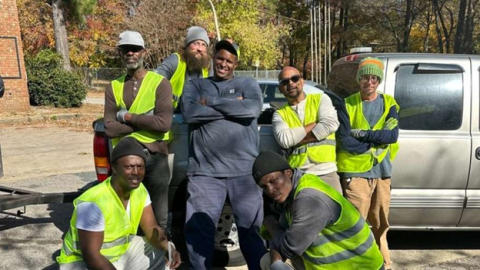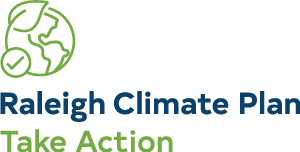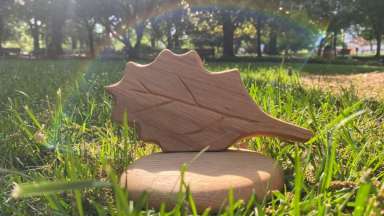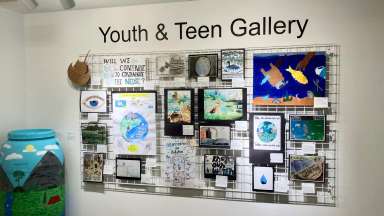Jump To:
While waste causes a relatively small percentage of greenhouse gas (GHG) emissions in Raleigh (just 1 percent), we must be intentional about how much we produce and where it goes.
Recycling in Raleigh
In 2023, the City of Raleigh worked with Sonoco Recycling to test the composition of materials sent to recycling facilities. The top forms of recycled products in the City were old corrugated cardboard (27 percent), mixed paper (21 percent), and glass (20 percent). Learn more about recycling in Raleigh and watch a video about it here.
The below chart shows pounds of waste and recycling in Raleigh in recent years.
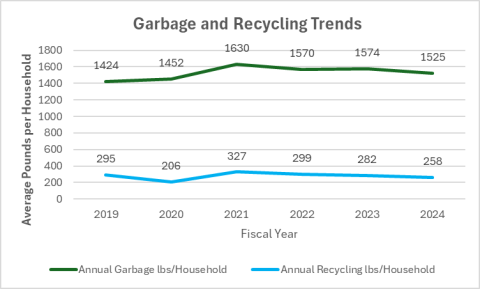
In Raleigh, a 2023 waste composition study found that about 18 percent of waste was recycled, 13 percent of waste was yard waste, and 69 percent of waste was garbage.
Helping Residents Recycle
In 2024, the City released the Raleigh Reuse app and web tool. It allows Raleigh residents and curbside collection customers to view their collection schedule and get up-to-date information on recyclable and waste materials. The free app is available on both Apple and Google app stores.
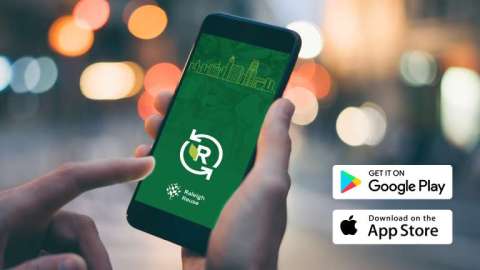
Reducing Plastic Water Bottles
The City re-launched a program call freeFILL in 2023. Businesses can participate in this program by agreeing to fill up reusable water bottles that community members bring in. This program can reduce plastic water bottles and make water more accessible, which is especially important with Raleigh experiencing higher temperatures year-round. In addition to many City facilities, over 25 businesses around the City are participating in the freeFILL program.
The City is also reducing plastic water bottles in its own operations. For example, Solid Waste Services decided in December 2019 that it would provide reusable rather than plastic water bottles to its staff and equipped vehicles with refillable water coolers.
Diverting Food Waste from the Landfill
Composting is the process of collecting certain types of yard waste and food waste and letting it break down into a soil enhancer that helps produce healthy plants. These yard and food scraps produce less methane, a particularly potent type of greenhouse gas, when they break down in a compost rather than when they are left in a landfill exposed to air.
The City of Raleigh currently offers options to collect and process residential yard waste. The U.S. Composting Council awarded the Raleigh Yard Waste Center the 2023 Large-Scale Compost Manufacturer of the Year. The award recognizes a commercial compost facility that creates over 10,000 tons of output and displays excellence in compost production and distribution. Homeowners, landscapers, and others purchase and use their products. The City of Raleigh added 95-gallon yard waste carts to its residential curbside pickup service during the summer of 2022. From July 2022 to July 2023, the City had a 39 percent increase in yard waste pickup.
The City of Raleigh is exploring ways to develop a sustainable food waste management solution. Solid Waste Services (SWS) is currently assessing the scope to expand processing and collections services at the Yard Waste Center. The Center does not currently accept food waste for processing and there is currently no other alternative within Wake County. Center staff will explore pathways to enable viable food waste processing beginning in 2026 by initiating a six-month Food Waste Processing Pilot Program. The Food Waste Processing Pilot Program does not include a collections service. SWS is evaluating collections service options and partnerships in the region and plans to share the findings after this pilot program has been completed.
How can residents currently compost their food scraps? They can create compost piles in their yards, use commercial compost pick-up services, or utilize drop-off locations found at community sites throughout Wake County. Learn more about composting in Raleigh.
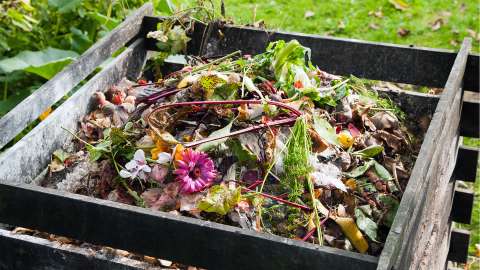
Innovating Biosolid Waste Management for Renewable Natural Fuels
The City’s Bioenergy Recovery Project involves turning wastewater into renewable compressed natural gas that can fuel up to 70 buses per year. In other words, what you flush down the toilet can power our buses! The City’s Bus Rapid Transit buses will make use of this wastewater-turned-fuel. This renewable fuel will significantly decrease the greenhouse gas emissions that would otherwise be a result of gas-powered buses. Raleigh will be one of the first cities to fuel its buses this way. Learn more about the Bioenergy Recovery Project.
Educating the Community Sustainable Waste Practices
The City’s Solid Waste Services department educates and engages with the community by offering tours of key facilities, including the Wilders Grove facility, Sonoco (the City's recycling processor), and the Yard Waste Center. The primary focus of these tours is to empower citizens with knowledge about proper recycling and yard waste preparation. Staff members lead informative sessions, sharing insights into the journey of recyclable materials and yard waste from curbside pickup to the processing facilities. These tours play a crucial role in promoting awareness and understanding of sustainability, recycling practices, and the importance of being responsible stewards of the city.
COR, The Great Raleigh Cleanup, and Place at the Table Partnership
The City of Raleigh is collaborating with The Great Raleigh Cleanup (TGRC) and A Place at the Table on a program, “The Workforce”, where people experiencing homelessness are paid for their participation in beautification projects around the community. This program is important for making Raleigh a more beautiful place to live, work, and play while also supporting equity and resilience by creating education and engagement with the community.
During the pilot, the program employed 18 residents, who worked a total of 400 hours at a living-wage rate of $18/hour ($7,200 in wages). Participants removed 7,670 pounds of litter and returned 74 shopping carts. They said the program provided valuable support for them, including the ability to get daily essentials and supplies, temporary housing, job experience, the ability to access other support programs that required reporting proof-of-income, and a sense of pride and accomplishment.
In June 2024, Raleigh City Council approved the continuation of the pilot program. While the Workforce program doesn’t provide housing to people experiencing homelessness directly, it’s an important step in building closer relationships and trust with them, helping them connect to vital and immediate resources, building work experience for future opportunities, and providing a way to earn funds for day-to-day needs. City staff will also work with TGRC and A Place at the Table to identify opportunities to strengthen the Continuum of Care resources for people experiencing homelessness and create a “pathway” for people to access these resources, utilizing the strong relationship that A Place at the Table and TGRC have built with community members in need.
